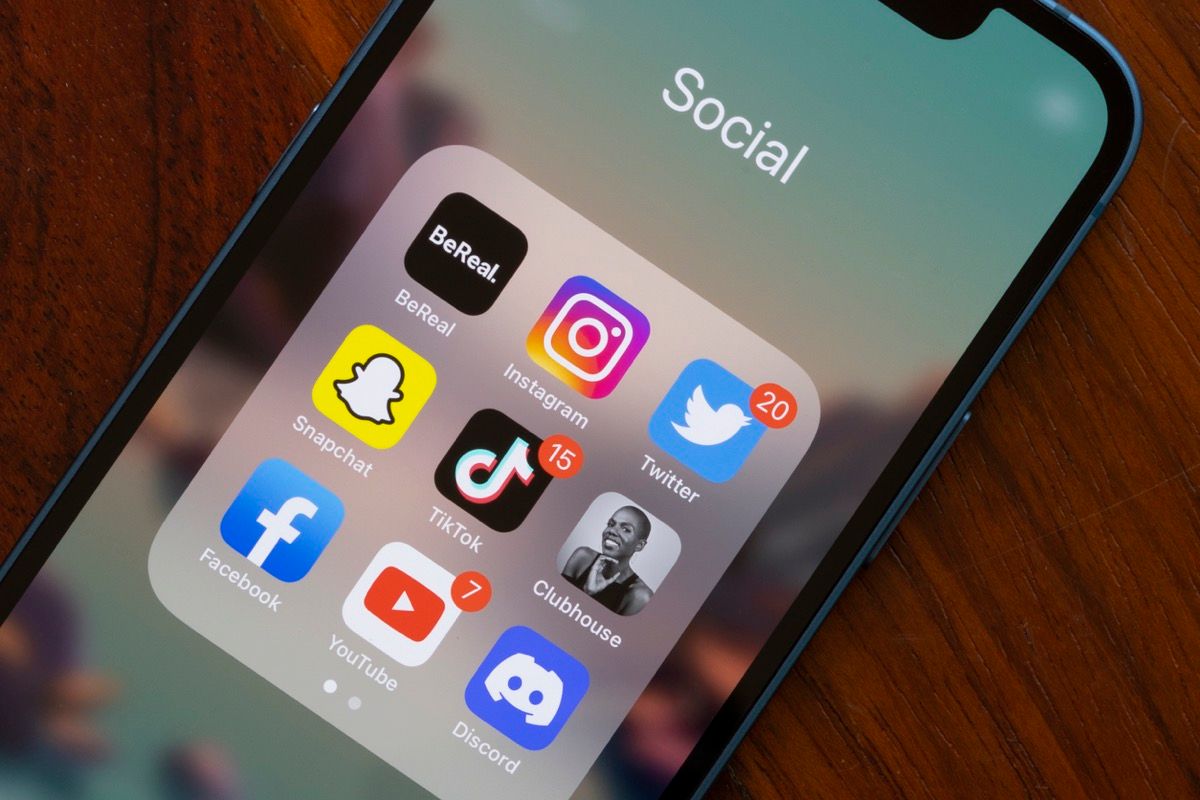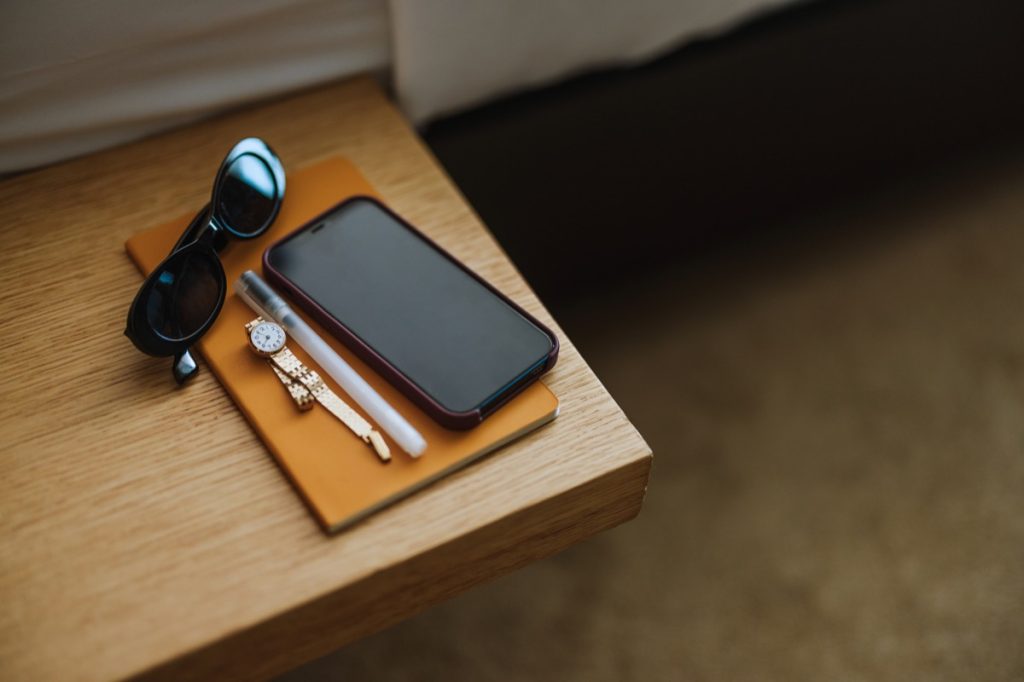How to Reduce Your Screen Time, According to Experts

Though devices have streamlined our daily lives, there’s no denying that using them can take up a little too much of our time. From mindlessly scrolling social media to casually browsing the internet, it’s easy to lose hours not doing much of anything important online and taking the time for a digital detox has become a priority for many who want to step away from their phones, tablets, and laptops. Fortunately, there are some simple ways to break the cycle and help you feel more present. Read on to learn how to reduce your screen time, according to experts.
RELATED: 8 Houseplants That Improve Your Mental Health, Science Says.
1
Delete social media apps.

The rise of social media has revolutionized the way we communicate, stay in touch with people, and even put ourselves out into the world. However, it can also be a huge time suck.
“Removing social media apps from your phone can drastically reduce your screen time,” says Jack Winston, founder & CEO of BePresent. But this doesn’t mean you need to cut yourself off from the digital world completely.
“If you come across apps that you don’t want on your smartphone but you still want or need to use occasionally, simply ‘shift’ them onto a different device, like your laptop,” suggests Teodora Pavkovic, director of wellbeing and digital wellness expert at Linewize. “It’s a relatively simple move, but one that will create healthy ‘friction’ that will help reduce your screen time and create better boundaries.”
2
Set up app time limits.

We’ve all made the mistake of picking up our phone and getting distracted by mindless tasks. Fortunately, there’s a built-in way to monitor how many minutes you’re burning while scrolling and tapping.
“If you have an iPhone, you can set app time limits on your phone as a gentle reminder that you should redirect yourself to another activity,” says Jenny Flora Wells, a Los Angeles-based holistic therapist. “You can even set a password on it and can have a friend set the password, so you can’t just ignore the reminder.”
RELATED: 20 Hobbies for Women That Will Enrich Your Life.
3
Increase physical distance from your phone.

Every buzz, beep, and vibration in your pocket can urge you to open up your device and begin scrolling. So why not step away from your device completely so you won’t be tempted?
“Keep your phone in another room whenever possible,” says Winston. “The increased effort to access it helps condition you to check it less frequently. Simple changes like turning your phone off during meals or while working can make a big difference.”
This method doesn’t just work during the day. Taren Coley, MD, psychiatrist and director of child and adolescent services at HopeWay also advises keeping your phone out of your bedroom by swapping it out for a traditional alarm clock.
“This change discourages you from starting your day with screen time and also limits the temptation to use your phone late at night, ensuring better sleep and less screen time,” she says.
Surprisingly, this simple change could have a significant effect on your screen time habits. “Just by buying an old-school alarm clock and taking your device out of your bedroom overnight, you can cut down about 30 minutes of screen time with very little effort,” says Pavkovic. “Research shows that 98 percent of people check their phones within the first 10 minutes of waking up!”
4
Try a trade-off with other activities.

If it’s too difficult to entirely give up your devices, try this other method that can help you gain back some of the productivity you lose while scrolling.
“For every block of time you spend on your device, commit an equal amount of time to a screen-free activity,” says Coley. “If you spend 30 minutes on social media, balance it out with 30 minutes of reading, exercise, or any hobby that doesn’t involve a screen. This trade-off method not only reduces screen time but can also improve your mental wellness.”
RELATED: 8 Affirmations to Feel Ridiculously Happy Every Day in Retirement.
5
Use voice commands more often.

A lengthy screen time session can sneakily start when you pull out your phone to do something genuinely productive. Fortunately, there are ways to use your device as the powerful tool it is without having to lay eyes on it.
“One way to continue to be productive but reduce the amount of time looking at a screen is to use voice commands and dictation,” Adrian Guffogg, therapist and psychosocial practitioner at Acquiesce, tells Best Life. “Utilizing the power of AI, we can save time but also do things ‘on the go’ without looking at a device as much.”
He says that this could apply to sending messages, writing out lists, ordering products, making notes, and playing music. “We still get the benefit of the action but can do it without focusing on a device,” Guffogg explains.
6
Turn off non-human notifications.

One simple change can make your phone or tablet less of a distraction.
“Disable all notifications that are not from actual people,” Winston suggests. “This reduces the constant distractions from apps trying to grab your attention for trivial updates. You’ll find it easier to focus on the tasks at hand without these interruptions.”
7
Replace screen time with a new hobby or interest.

Screen time feels wasteful because it ultimately saps the precious minutes and hours we have to get anything done during the day. If you’re feeling the itch to scroll, try to replace your phone with another item or activity.
“Finding other fulfilling hobbies and activities or spending time with loved ones instead of using your device is another excellent way to replace one habit with another,” says Ken Fierheller, registered psychotherapist and owner of One Life Counselling & Coaching. “For example, if you find yourself spending an hour on your phone immediately after work, consider scheduling a class, making plans with a friend, or committing to reading a book instead during that time.”
It also doesn’t need to be a major change or commitment to be effective, either. “Compile a list of quick, productive tasks such as organizing your desk, watering plants, or even meditating,” Coley recommends. “Whenever you feel the urge to scroll through your phone, pick a task from the list to keep your hands and mind engaged elsewhere.”